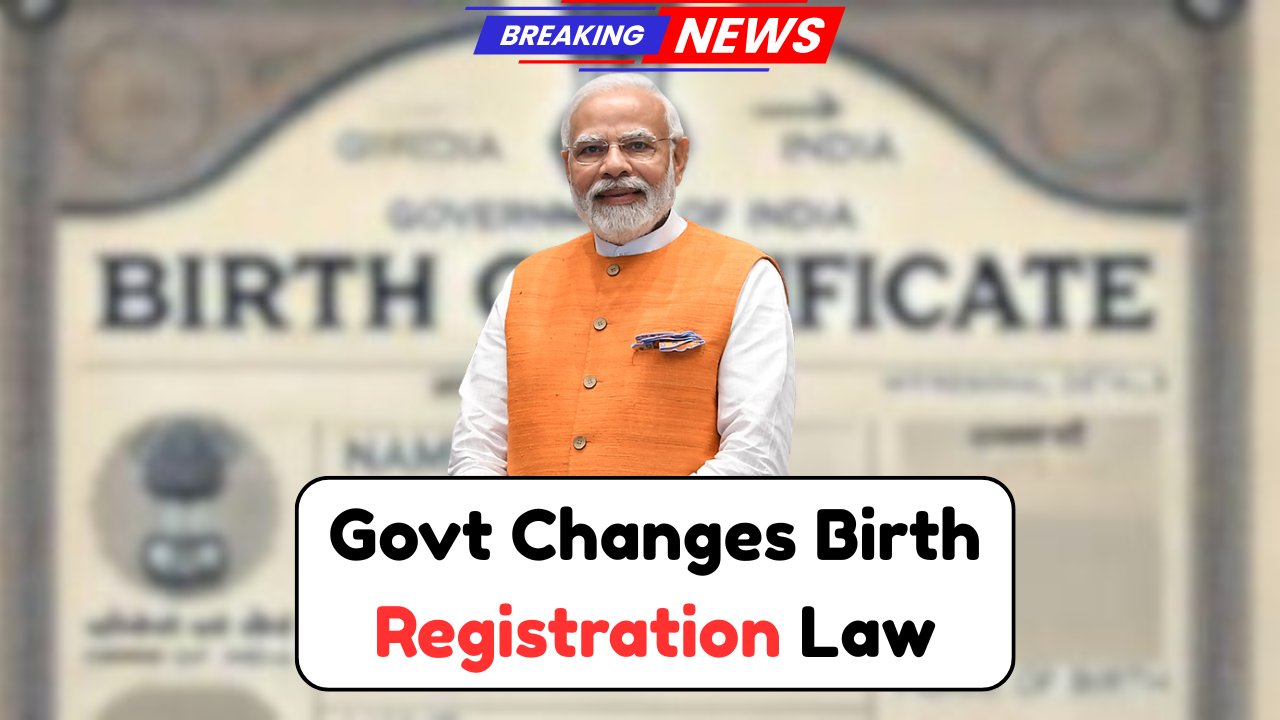New Birth Certificate Rules : In a significant move to digitize and centralize citizen records, the Government of India has rolled out new nationwide rules regarding birth certificates. These changes are part of the Registration of Births and Deaths (Amendment) Act, 2023, which came into effect in 2024. The new policy aims to streamline the issuance of birth certificates and expand their official usage for various services.
This article explains the latest birth certificate rules, what documents are needed, how the process has changed, and how it affects Indian citizens and parents of newborns.
What Are the New Birth Certificate Rules in India?
Under the new guidelines, birth certificates will now serve as a single-point document for a wide range of official purposes. The government intends to use a centralized national database to record all births and make the process transparent, efficient, and digital-first.
Key Highlights of the New Rules
- Birth certificates will now be mandatory for school admissions, voter ID, Aadhaar, and government job applications.
- A national digital database of births will be maintained by the Registrar General of India.
- Hospitals and institutions must report births directly to the centralized portal.
- Citizens can apply for digital birth certificates through the portal.
- Real-time updates and tracking of application status are enabled.
- The certificate will serve as proof of age and identity across departments.
- The system is designed to reduce manual intervention and ensure faster processing.
Why These Changes Were Introduced
The government implemented these new birth certificate rules to:
- Eliminate duplicate or fake records
- Promote ease of access to vital documents
- Digitally link citizen data across departments
- Improve delivery of welfare services
- Create a unified identification record
This initiative aligns with India’s broader vision of Digital India and Good Governance by ensuring transparency, accountability, and speed in documentation processes.
Major Changes in Usage of Birth Certificate
One of the most impactful updates is the expanded role of the birth certificate. Here is a table showing the new official uses allowed under the updated act:
| Purpose | Old Rule (Before 2024) | New Rule (From 2024) |
|---|---|---|
| School Admissions | Birth certificate optional | Mandatory |
| Government Job Applications | Age proof varied by dept. | Birth certificate mandatory |
| Voter Registration | Age proof via other documents | Birth certificate required |
| Passport and Visa Applications | Multiple ID proofs needed | Birth certificate as age proof |
| Aadhaar Card Enrollment | Birth certificate not required | Birth certificate required |
| Marriage Registrations | Optional | Strongly recommended |
| Driving License Issuance | Birth certificate optional | Mandatory for applicants under 18 |
| Pension or Retirement Claims | Other proofs accepted | Birth certificate accepted |
How to Apply for a Birth Certificate Under the New Rules
Applying for a birth certificate under the updated system is now more simplified and digitalized.
Step-by-Step Process
- Visit the official birth registration portal of your state or the centralized national portal (once fully operational).
- Select “Register Birth” and fill in the required details.
- Upload supporting documents such as hospital discharge summary, Aadhaar of parents, etc.
- Submit the application and note down the application ID for tracking.
- Once verified by the authorities, the digital certificate will be issued and available for download.
Required Documents
| Document | Purpose |
|---|---|
| Hospital Birth Proof | Confirms birth details |
| Aadhaar of Parents | Identity verification |
| Marriage Certificate (if any) | For record linkage |
| Proof of Residence | Address confirmation |
| Application Form | Details of the newborn |
| Passport-size Photo (if required) | Optional in some states |
Who Will Be Most Affected by These Changes?
These new rules impact a broad group of people:
- Parents of newborns: Must register births immediately through the digital portal.
- Students: Birth certificate now compulsory for school admissions.
- Young voters: Must present the birth certificate for new voter ID registrations.
- Government job seekers: Need the certificate as proof of age and identity.
- Rural citizens: May require assistance from local officials to comply digitally.
The changes are aimed at providing long-term benefits but may initially require adjustment from those unfamiliar with digital processes.
Government’s Vision Behind the Reform
The government aims to:
- Modernize the civil registration system
- Ensure timely and accurate record keeping
- Reduce dependency on multiple documents for identity verification
- Prevent identity fraud and duplication in government services
- Create an efficient public service delivery system
Advantages of the New Birth Certificate System
Here are the major benefits for citizens:
- Single Identity Document: No need for multiple age proofs.
- Digital Access: Apply and download certificates from anywhere.
- Transparency: Real-time updates and online status checks.
- Time-Saving: No long queues or delays at municipal offices.
- Secure Data Storage: Centralized, tamper-proof records.
The new birth certificate rules mark a major administrative transformation in India. By digitizing birth records and making the certificate a central identity document, the government is laying the foundation for a more integrated and efficient governance system. While the transition might seem complex at first, it is designed to offer long-term benefits in ease of access, fraud prevention, and service delivery.
